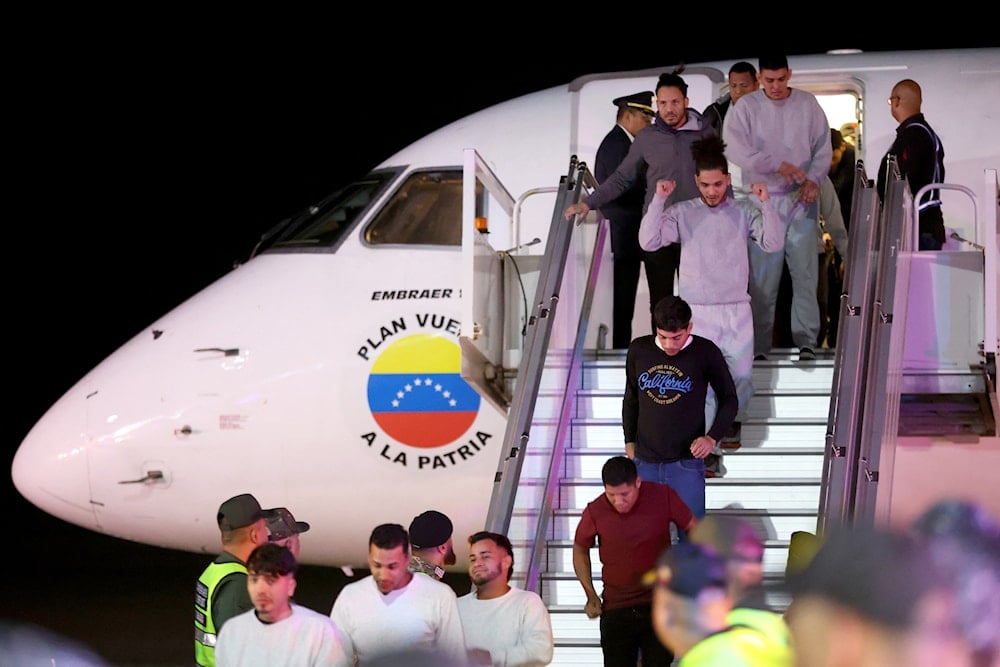Maduro announces repatriation of 190 Venezuelans from the US
The Venezuelan president accuses far-right opposition figures of involvement in a human smuggling network that has exploited the country’s migration crisis for financial gain.
-

Venezuelan migrants deported from the US arrive at Simon Bolivar International Airport in Maiquetia, Venezuela, on February 10, 2025. (AFP)
Venezuelan President Nicolas Maduro has announced the return of 190 Venezuelans from the United States under the government’s Plan Vuelta a la Patria (Return to the Homeland Plan), an initiative designed to facilitate the repatriation of citizens who emigrated in search of better opportunities.
Speaking during his program Con Maduro+, the Venezuelan leader emphasized that this repatriation marks the initial phase of the Zero Agenda, which includes renewed calls for the US to lift economic sanctions on Venezuela. Maduro underscored that these sanctions have severely impacted the country's economy, leading to substantial losses in national revenue.
He also stressed the importance of treating migrants with dignity and respect, asserting that many Venezuelans had been misled by far-right groups and left the country in pursuit of better economic conditions for their families. Maduro also expressed confidence that as Venezuela’s economy stabilizes, more expatriates would choose to return.
Maduro revealed that two aircraft owned by the state-owned airline Conviasa were dispatched to the United States to facilitate the repatriation, noting that the initiative had been delayed due to what he described as US authorities’ persecution of the airline, as well as obstacles posed by some Central American governments.
Reaffirming his openness to dialogue with Washington, Maduro called for a relationship based on mutual respect and economic cooperation. “We have taken a step, and we hope to sustain it over time,” he stated, underscoring his commitment to repatriating Venezuelans and strengthening bilateral relations.
The flights followed a January 31 meeting between Maduro and a visiting envoy of US President Donald Trump, during which the Venezuelan leader agreed to accept the return of deported migrants.
Trump, who has pledged the largest deportation campaign in US history, has vowed to expel millions of undocumented immigrants, including many from Latin America.
"Venezuela has always made it clear that any transfer of Venezuelans must be done with absolute respect for their dignity and human rights," Caracas said in a statement, expressing optimism for "a new beginning" in bilateral relations based on mutual respect.
Meanwhile, the White House posted an image on social media platform X showing migrants in handcuffs and shackles boarding a Conviasa plane. The post read, "Repatriation flights to Venezuela have resumed, with Ambassador @RichardGrenell overseeing the first two flights. MAKE AMERICA SAFE AGAIN."
During his campaign, Trump frequently cited crimes allegedly committed by undocumented migrants, despite studies indicating that immigrants are statistically less likely to commit crimes than US-born citizens.
Following his meeting with Maduro, Grenell returned to the United States with six Americans who had been detained in Venezuela. The day after their talks, Trump announced on his social media platform Truth Social that Venezuela had "agreed to receive, back into their Country, all Venezuela illegal aliens who were encamped in the US" and would also provide transportation for their return.
Grenell’s visit to Caracas marked a rare diplomatic engagement between the two nations, given that Washington did not recognize Maduro’s re-election last year for a third six-year term.
Maduro accuses Venezuelan opposition figures of exploiting migration crisis
In a related context, Maduro accused far-right opposition figures of involvement in a human smuggling network that has exploited the country’s migration crisis for financial gain.
He said that prominent opposition figures—including David Smolansky, Leopoldo Lopez, Carlos Vecchio, Miguel Pizarro, Carlos Paparoni, Julio Borges, and Juan Guaido—have led this network, which he claimed has charged Venezuelan migrants exorbitant sums to facilitate their departure in search of better opportunities abroad.
The Venezuelan president underscored the dire consequences of this situation, pointing out that many migrants have been subjected to scams, kidnappings, and assaults.
"This is known by the security agencies of the countries where these crimes were committed," Maduro asserted, calling for justice for the victims.
Beyond seeking accountability for those responsible, Maduro also proposed investigating and confiscating the assets of those financing the alleged human smuggling operation.
"Justice must be served," he underlined, insisting on the need to dismantle practices that have inflicted significant harm on Venezuelans.
Maduro contextualized his accusations within the broader economic challenges facing Venezuela, reiterating that the country has lost 99% of its revenue, a situation that has driven many citizens to seek opportunities beyond its borders.
According to the president, smugglers have exploited this desperation, charging up to $10,000 to transport people to the United States and other destinations, including Peru and Chile.
Read more: Trump ends temporary protected status for Venezuelans in retaliation

 5 Min Read
5 Min Read










